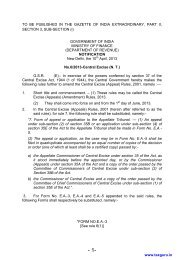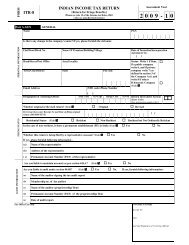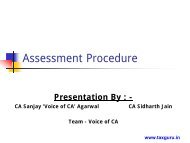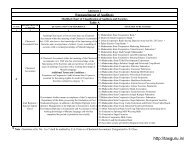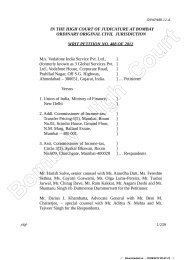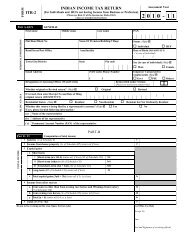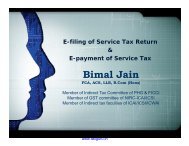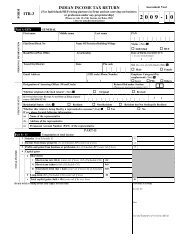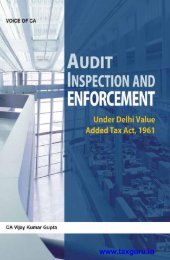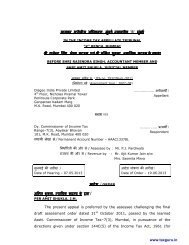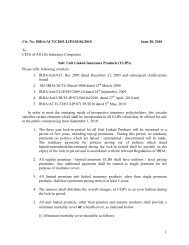Download eBook on Survey, Search & Seizure under ... - TaxGuru
Download eBook on Survey, Search & Seizure under ... - TaxGuru
Download eBook on Survey, Search & Seizure under ... - TaxGuru
You also want an ePaper? Increase the reach of your titles
YUMPU automatically turns print PDFs into web optimized ePapers that Google loves.
<strong>Survey</strong>, <strong>Search</strong> & <strong>Seizure</strong> | 33 |Gems of judiciary1. CIT vs. Smt. Chitra devi S<strong>on</strong>i [2008] 170 Taxmann 164 (Raj.) also seeL.R. Gupta vs. uni<strong>on</strong> of India [1992] 194 ITR 32 (del), SLP dismissedFor valid search, any of the situati<strong>on</strong> as enumerated above shouldpersist other wise the entire acti<strong>on</strong> could vitate.2. Commissi<strong>on</strong>er of Income-tax Vs. S. K. Katyal [2009] 308 ITR0168 (del). Normally, a search must be c<strong>on</strong>tinuous. If it cannot bec<strong>on</strong>tinuous for some plausible reas<strong>on</strong>, the hiatus in the search mustbe explained. If no cogent or plausible reas<strong>on</strong> is shown for the hiatusin the search, the sec<strong>on</strong>d or resumed search would be illegal. Merelymenti<strong>on</strong>ing in the panchnama that a search has been temporarilysuspended does not ipso facto c<strong>on</strong>tinue the search. It would have tobe seen as a fact as to whether the search c<strong>on</strong>tinued or had c<strong>on</strong>cluded.Merely because a panchnama is drawn up <strong>on</strong> a particular date, it doesnot mean that a search was c<strong>on</strong>ducted and/or c<strong>on</strong>cluded <strong>on</strong> that date.The panchnama must be a record of a search or seizure for it to qualifyas the panchnama.b. Reas<strong>on</strong> to believe.<strong>Search</strong> invades the privacy of a citizen. Thus, reas<strong>on</strong> to believe by theauthorizing officer must be apparent from the records of the case. Theopini<strong>on</strong> or the belief so recorded should clearly dem<strong>on</strong>strate that the casefalls with in any <strong>on</strong>e or more clauses c<strong>on</strong>tained in clauses (a), (b) and (c)of sub secti<strong>on</strong> (1) of secti<strong>on</strong> 132. therefore, a search or seizure cannot besustained unless it is clearly shown that it was carried out by authorityduly authorized, and all the c<strong>on</strong>diti<strong>on</strong>s precedent in relati<strong>on</strong> there toexisted.“Reas<strong>on</strong> to suspect” that petiti<strong>on</strong>er is having undisclosed assets and thereis likelihood that same would not be disclosed is not equal to “reas<strong>on</strong> tobelieve” that petiti<strong>on</strong>er is in possessi<strong>on</strong> of undisclosed assets and intendsto evade tax. Therefore, search and seizure carried out <strong>on</strong> the basis of“reas<strong>on</strong> to suspect” is not valid because “reas<strong>on</strong> to believe” is mandatoryrequirement of law for search and seizure. [Mahesh Kumar Agarwal v. Dy.Director of Income Tax & Ors. (2003) 260 ITR 67 (Cal).].www.taxguru.in






